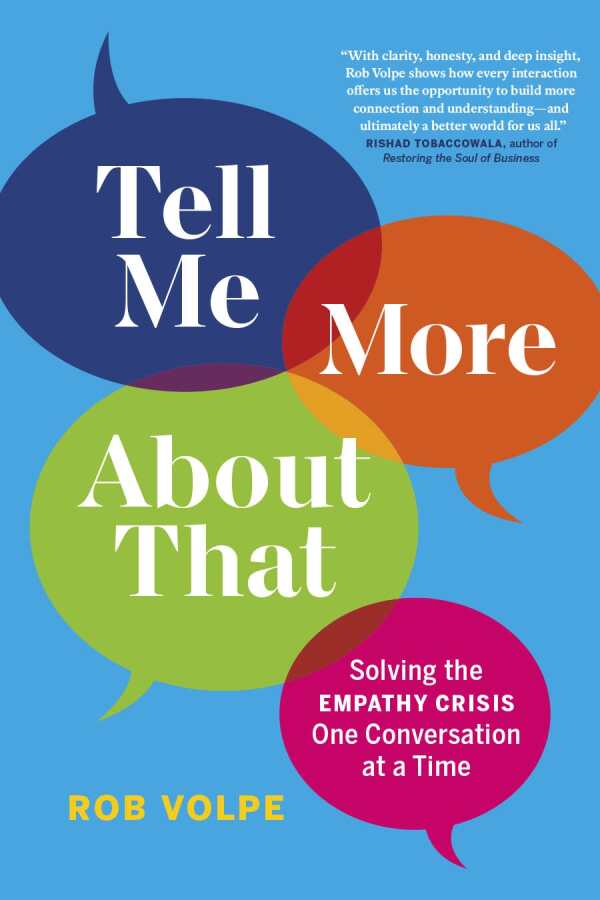Tell Me More About That
Solving the Empathy Crisis One Conversation at a Time
Tell Me More About That is a self-help guide to becoming more patient and compassionate with others.
Rob Volpe’s self-help book Tell Me More About That urges letting go of personal judgments on controversial topics.
Having interviewed people across the United States in his job as a market researcher, Volpe asserts that social media obstructed Western society’s sense of empathy by prioritizing a fast, materialistic culture. Citing statistical studies about Americans’ work versus life attitudes before and after Covid-19—most respondents of which expressed a desire to see life from others’ points of view—the book introduces 5 Steps to Empathy. Lines from Volpe’s interviews intercut the book’s anecdotes, which relate experiences of engaging with others in meaningful ways and bridging social gaps.
The book also draws on Volpe’s experiences of being bullied for being LGBTQ+ to make its proposals. It adopts a compassionate tone, and strives to offset typical interviewer-subject dynamics, which it says promote sympathy (projecting a hierarchy of judgment onto subjects) rather than empathy (experiencing and feeling from another’s perspective on equal footing). In such interactions, one doesn’t always know what they are going to get. Still, the book’s shared discussion questions encourage people to seek empathetic solutions, analyzing personal scenarios in unfamiliar territory. They also note subtle communication clues that can change the outcomes of conversations.
Because the book is rooted in personal experiences, though, its general applications are sometimes more limited. Volpe’s skills as an interviewer are clear, but other people may not be able to replicate them in everyday situations. Still, the book is vulnerable in noting moments when Volpe’s empathy as an interviewer failed, as with an LGBTQ+ subject who was not out, for example, and who is recalled as having been chatty about his relationship with his mother and little else. The book admits a preemptive suspicion that the subject and his mother had an unhealthy relationship as a result. But the book also uses that prejudgment as an opportunity for growth, addressing stereotypes of marginalized people. Indeed, dismantling judgment is heralded as the most important—and most difficult—step of the book’s recommended process. The other four steps are not covered in equal depth.
There’s a political angle to the text, which covers empathetic conversations on controversial topics, including recreational marijuana use, gun control, and sexual harassment. While its discussions of fear surrounding issues like gun control are compelling, personal beliefs direct such portions, too, which still note that all people have different lives and perspectives. And the book queries the roots of limited empathy, suggesting that legacies of immigration policies and racism inhibited people’s empathy and increased judgments. It muses that, if empathy is achieved through an unjudgmental beginner’s curiosity, it may be hard to access when a person is encountering another culture.
Urging its audience to reflect on their interactions with others, Tell Me More About That is a self-help guide to becoming more patient and compassionate in society.
Reviewed by
Aleena Ortiz
Disclosure: This article is not an endorsement, but a review. The publisher of this book provided free copies of the book and paid a small fee to have their book reviewed by a professional reviewer. Foreword Reviews and Clarion Reviews make no guarantee that the publisher will receive a positive review. Foreword Magazine, Inc. is disclosing this in accordance with the Federal Trade Commission’s 16 CFR, Part 255.

